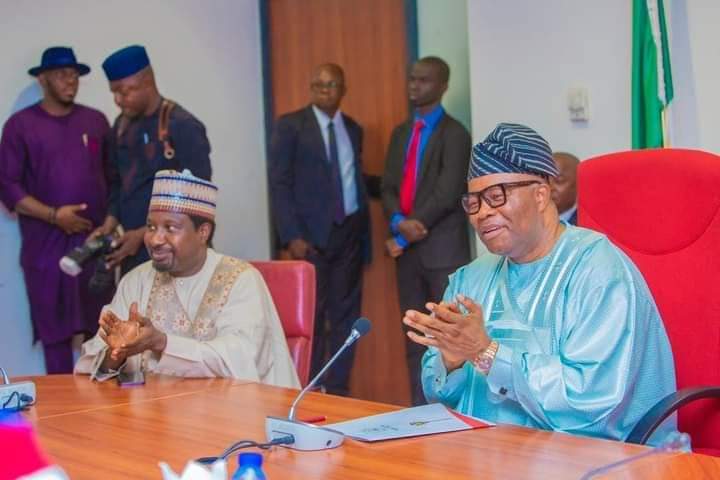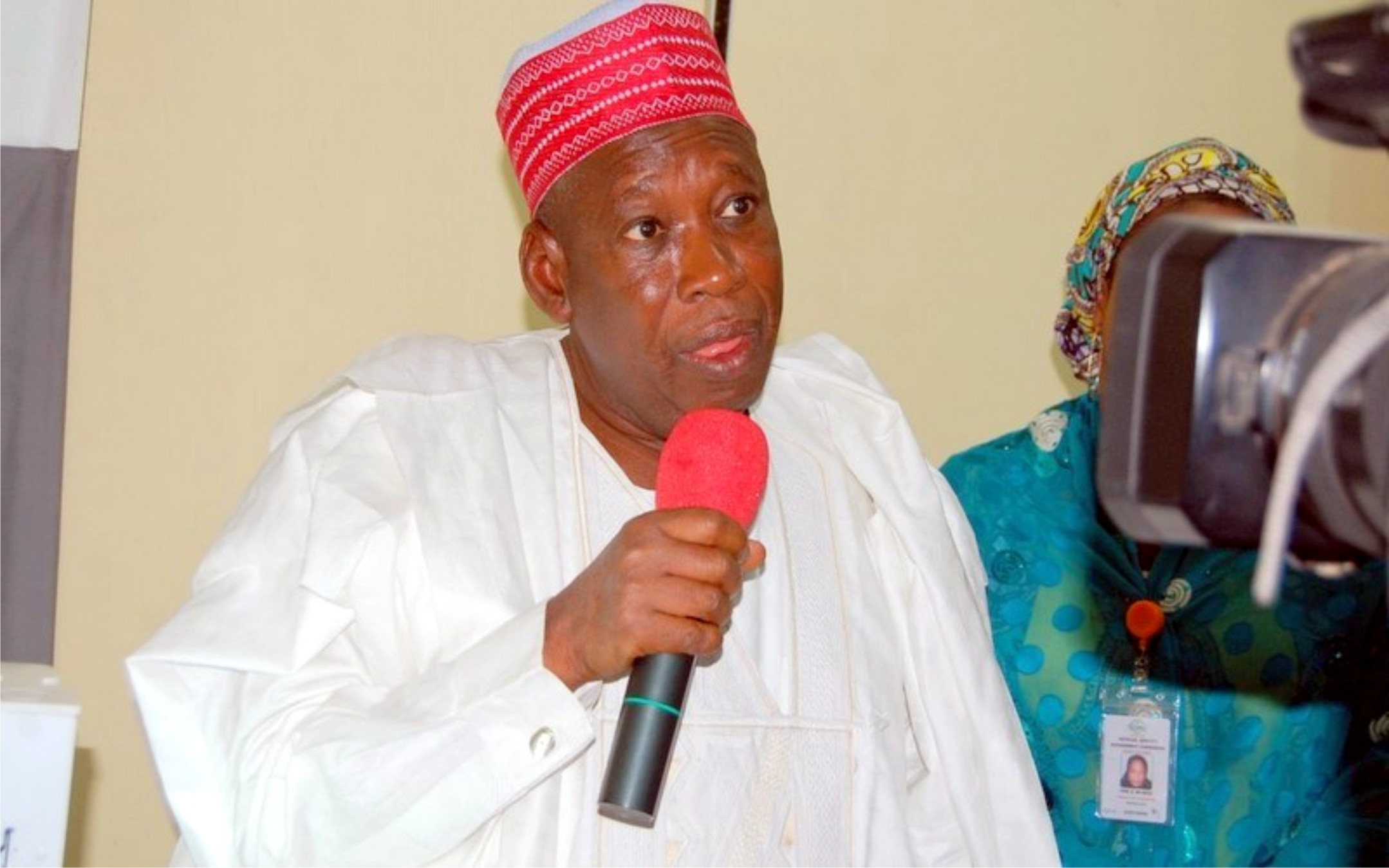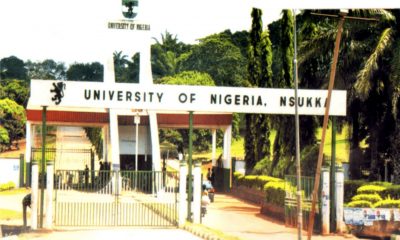Politics
Politics Of Parties De-registration
Recently, the Independent National Electoral Commission had de-registered seven out of the registered 63 political parties.
The seven parties were said to have failed to field candidates for various elective positions during the last general elections.
The affected parties are Democratic Alternatives, National Democratic Council, National Action Council, Mass Movement of Nigeria, Nigeria People Congress, Nigeria Elements Progressive Party and the National Unity Party.
Announcing the decision, the chairman of the Commission, Prof. Attahiru Jega said although there was a case before, a federal high court on the de-registration of political parties, the affected parties were not parties to the case.
He said the Commission decided to invoke the provisions of section 78 (7) of the Electoral Act 2010, as amended, section 78 subsection 7 (1) and (ii) said that the commission shall have power to de-register political parties on the following grounds (i) Breach of any of the requirements for registration and (ii) for failure to win presidential or governorship election or a seat in the National or State Assembly election.
The Independent National Electoral Commission is insisting on the effective compliance with these provisions of the Electoral Act, but some political party leaders and politicians had noted that deregistration of political parties is irrelevant for now.
Meanwhile, If INEC opts to act and exercise the statutory powers vested in the commission on the later part of the Electoral Act provision then 56 political parties beside, Peoples Democratic Party (PDP) Action Congress of Nigeria ((ACN) All Nigeria People Party (ANPP) Congress for Progressive Change (CPC) All Progressive Grand Alliance (APGA) Labour Party (LP) and Democratic Peoples Party (DPP) will be scrapped.
The INEC’s chairman, Prof Attahiru Jega addressing newsmen recently said INEC was ready to commence the process of de-registration of political parties that failed to win a seat in the April polls.
But Prince Favour Felix Reuben state chairman, Labour Party faulted INEC decision , but advised the commission to focus attention on the process of strengthening democratic tenets in Nigeria rather than deregistering political parties.
Prince Reuben said “INEC should rather strengthen the democratic institutions in order to restore the confidence of Nigerians, and the International community.
Also, a legal practitioner based in Port Harcourt, Theoplilus Oru said INEC should allow the smaller political parties exist along side the major political parties.
Barr Oru said “INEC must improve on the requirements for the registration process by a political party and not to limit the political space by contemplating or intending to deregister some political parties”.
He further stressed that “even in the advance countries smaller political parties exist alongside the major national political parties”.
The legal practitioner added that “the political space must be opened up, broaden to enrich the nation’s political flavour , and participatory democracy by Nigerians”.
John Okarafor, a legal practitioner of Ezra Chambers based in Port Harcourt agreed that some of the existing political parities are only on paper without any evidence of visible offices in most states”
However, he reasoned that the deluge of orders served on the commission by various courts, should not compel Prof Attahiru Jega to pay the small parties in their own corn.
He further said, some political parties existed in name, while some of these so called political parties were formed as extension of family business to collect subvention from INEC without any business of being a political party.
Barr Okarafor supported INEC to deregister or scrap political parties that have failed to make any electoral impact during the April polls.
Looking at the recommendations of the Electoral Reform Committee (ERC) set up in 2007 under the distinguished chairmanship of retired Chief Justice of the Federation Hon Justice Muhammadu Uwais that Section 222 of the 1999 constitution should be amended to add two more conditions to be met by association seeking registration as political parties namely (i) the association must maintain functional and verifiable offices in at least two thirds of the states of the federation. Again, that political party which score below 25 per cent of vote at an election should be denied INEC grant.
Barr Okarafor said most of the political parties have failed to meet up this provision of scoring 25 per cent during election and having national offices in 2/3 of the 36 states and therefore should be deregistered immediately by INEC.
However, to stop INEC from executing the provision of the Electoral Act Section 78 (7) (ii) Hon Emmanuel Rukari, a leader of a registered political party, African Renaissance Party (ARP) had dragged the National Assembly before an Abuja Federal High Court seeking a declaration that the National Assembly went contrary to the provision of Section 40 of the Nation’s constitution by giving powers to INEC to deregister any political party that failed to win seats in either the National or State House of Assembly.
Section 40 of the 1999 constitution as amended states that “Every person shall be entitled to assemble freely and associate with other persons and in particular he may form or belong to any political, trade union or any other association for the protection of his interests.”
Provided that the provisions of this section shall not derogate from the powers conferred by this constitution on the Independent National Electoral Commission with respect to political parties to which that commission does not accord recognition”.
Furthermore, other plaintiffs in the originating summons of the legal action before the Federal High Court over the power of deregistration of political parties included International Society for Social Justice and Humanity (ISSJH) while the defendants are the Senate, House of Representatives and INEC.
Dr Amuda-Kannike, a Port Harcourt based legal practitioner is the plaintiff’s lawyer. He said: we are asking the Federal High Court to determine whether section 78 (7) (11) of part V of the Electoral Act 2010 as amended should not be declared null and void because it runs contrary to section 40 of the 1999 constitution as amended.
Dr Amuda-Kannike further said: it is the said section 40 of the constitution that provided room for formalities of most political association in Nigeria giving rise to formation of political parties, which include the first plaintiff political party African Renaissance Party (ARP).
Dr Kannike further argued that the introduction of Section 78 (7) (11) into the Electoral Act was a ploy by members of the National Assembly to allow only their parties to participate in the electoral process while others will be excluded.
Other legal practitioners reacting to INEC move to Prone the number of political parties said registration and existence of political parties is a constitutional matter, which an Act of the National Assembly cannot invalidate.
Barr Jas Awanen said: if political parties are to be deregistered then the constitution which provides for the registration of such political parties would have to be amended before the deregistration can be carried out by INEC.
Therefore, it stands to be reasoned that every provision not in conformity with the constitution cannot stand.
Political analyst argued that reducing the number of political parties to either two or three will not only enhance and strengthen the survival of Nigeria’s democratic institutions but ensure meaningful participatory democracy in the country.
Let the court decides before INEC comply with the provision of the Electoral Act 2010 as amended.
This step many political observers argued would remove the suspicion that there is no under hand dealings in the temple of justice that warned against violation of the rule of law.
Philip – Wuwu Okparaji
Politics
Reps Urge FG To Pay ASUU, NASU’s Withheld Salaries

The House of Representatives has urged the Federal Government to pay the withheld salaries of the Academic Staff Union of Universities (ASUU) and the Non Academic Staff Union (NASU).
This followed the adoption of a Motion of Urgent Public Importance by Rep. Abubakar Fulata (APC-Jigawa) during plenary on Wednesday.
Presenting the motion, Fulata said that the government must accede to the unions’ demands because they were genuine.
Adopting the motion, the House urged the President to direct the relevant bodies to come up with modalities for negotiation with both ASUU and NASU.
The House said this would enable them to come up with workable, implementable and final agreement to be signed by both parties.
The House urged the president to direct the Ministry of Finance, to ensure full implementation.
The House mandated its Committees on University Education, Polytechnic Education, Federal Colleges of Education, Labour and Productivity, Finance, Legislative Compliance to ensure compliance.
Politics
Bill To Prescribe Salaries, Allowances Of Judicial Officers Pass 2nd Reading

The bill seeking to prescribe salaries, allowances, and fringe benefits of Judicial office holders in Nigeria has passed second reading at the Senate.
This followed the presentation of the general principles of the bill by the sponsor, Sen. Lola Ashiru (APC-Kwara) at plenary on Thursday.
Presenting the bill, Ashiru said the bill, an executive bill, was forwarded to the two Chambers of the National Assembly by President Bola Tinubu, in accordance with provisions of Section 58(2) of the Constitution of the Federal Republic of Nigeria 1999, as amended.
He said the bill, in a nutshell, seeks to prescribe salaries, allowances and fringe benefits for judicial officers in order to nip in the bud, the prolonged stagnation in their remuneration.
This, he said was to reflect the contemporary socio-economic realities of the time.
Ashiru said the bill intends to unify the salary structure, allowances and fringe benefits of judicial officers holders both in the Federal and at the State levels.
“This proposed legal framework, undoubtedly, will bring about significant improvement in the welfare, capacity and independence of the Judiciary, which have been contentious issues of public discourse over the years.”
He said that the intent of the bill was in conformity with the current administration’s resolve to strengthen the country’s Judiciary and the criminal justice system .
This, he said was to ensure its independence in the performance of its constitutional role, as the arbiter of the temple of justice.
He urged the senators to support the expeditious passage of the bill in view of its importance to the socio-economic and political development of this country.
Sen. Mohammed Monguno (APC-Borno), who seconded the motion said it was necessary to ensure adequate remuneration of Judicial officers was in line with the current economic reality.
He said that there was the need to provide an adequate remuneration that would prevent judicial officials from being tempted for corruption.
Sen. Orji Kalu (APC- Abia ) commended the executive for presenting the bill to prescribe a remuneration for the judicial arm of government, saying that no right thinking Nigerian would want to oppose it.
He urged the officials to ensure that justice is dispensed rightly to Nigerians.
He also urged the government to improve remuneration of other sectors given the economic reality.
Deputy President of Senate, Barau Jubrin (APC-Kano) said the President has done creditably well by presenting the bill for remuneration of the judicial officials.
He said the judicial officials had suffered in silence for as they were not disposed to speaking up on the issues, just like the labour unions.
He said it was cheery and commendable for President Tinubu to have brought the bill, which was designed to enhance the salary and welfare of the judicial officials.
President of Senate, Godswill Akpiabio said presentation of the bill was a right step in the right direction by President Tinubu.
Akpabio, referred the bill to the committee on Judiciary, Human Rights and Legal Matters for further legislative inputs and to return back to plenary in four weeks, after the bill was read for the second time.
Politics
Court To Hear Suit Against Ganduje’s Suspension, May 28

Justice Abdullahi Muhammad Liman of the Federal High Court, Kano, has fixed May 28 for hearing in the substantive application filed by the All Progressives Congress (APC) National Chairman, Abdullahi Ganduje.
Dr Ganduje is challenging his suspension from the party by factional ward executives led by one Basiru Nuhu Isa.
He was first suspended by APC Ganduje Ward executives led by one Haladu Gwanjo on April 15. Another faction emerged and also announced suspension of Dr Ganduje on April 20.
The Tide source reports that the secretary of the party in Kano, Zakari Sarina, said the suspension by the faction was another case of impersonation.
Dr Ganduje is seeking a declaration that his suspension from the party without giving him opportunity to defend himself amounts to violation of his fundamental right to fair hearing.
He is also seeking a declaration that his suspension by the faction was unlawful, null and void.
Counsel for the embattled APC chairman, Hadiza Ahmad, applied for service on the respondents by substituted means which the court granted.
Justice Liman adjourned to May 28 for hearing in the matter.
-

 Business2 days ago
Business2 days agoCustoms Condemns Attack On Officers In Katsina
-
Politics23 hours ago
Dissolve Your Cabinet Now, Senator Ibrahim Tells Tinubu
-
Women22 hours ago
Women Can Eradicate Child Abuse In Homes
-

 Business21 hours ago
Business21 hours agoVets Make Case For Massive Investments In Agric Technology
-
Rivers3 days ago
FG inaugurates PH-Aba Rail Project … As Train Service Begins
-

 Niger Delta2 days ago
Niger Delta2 days agoCommunity Demands Employment Quota From Public, Private Institutions
-
Niger Delta23 hours ago
Diri Approves Land For FG’s Housing Project
-
News22 hours ago
NSCDC Commandant Bags Five-Year Jail Over Employment Fraud

